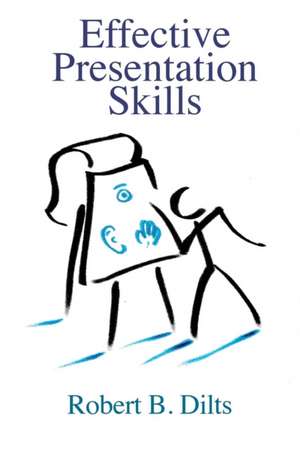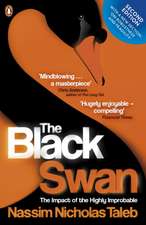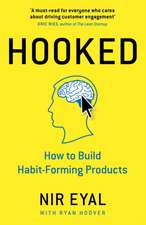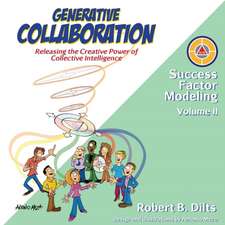Effective Presentation Skills
Autor Robert Brian Diltsen Limba Engleză Paperback – 10 dec 2017
Effective Presentation Skills
At some point in our lives we are probably all called upon to make a presentation. It may be at school, a social function of form some professional purpose. The demands of the "Information Age" make it increasingly necessary and likely that we will need to make presentations as part of our normal activities.
Making an effective presentation requires the ability to communicate and relate to other people. These are very basic skills, yet they are not usually taught to us as part of our traditional classroom education or professional training. The purpose of this book is to provide some of the key practical communication and relational skills necessary to make effective presentations.
The great Greek philosopher Aristotle maintained that an effective speaker had to have three basic abilities: (1) to reason logically, (2) to understand human character and (3) to understand the emotions. These capabilities appear to be as relevant today as they were twenty-five hundred years ago.
This book is about how to develop skills that support these abilities by applying modern developments in the psychology of learning and communication primarily drawn from the field of Neuro-Linguistic Programming.
While the skills in this book are relevant for all types of presentations, the focus is on people who make presentations for professional reasons. In particular, it focuses on presentations for teaching and training purposes, i.e., those related to organizational learning. In addition to professional trainers and teachers, it includes managers, consultants and others who need to share knowledge and information.
The book covers three general areas involved in making effective presentations in a learning context including (1) basic principles for forming an effective communication strategy, (2) designing and planning effective presentations and presentation materials and (3) managing issues related to motivation and interactions with a group or audience.
Preț: 158.75 lei
Nou
30.38€ • 31.60$ • 25.08£
Carte disponibilă
Livrare economică 22 martie-05 aprilie
Specificații
ISBN-10: 1947629190
Pagini: 272
Dimensiuni: 152 x 229 x 15 mm
Greutate: 0.37 kg
Editura: Dilts Strategy Group
Descriere
Effective Presentation Skills
At some point in our lives we are probably all called upon to make a presentation. It may be at school, a social function of form some professional purpose. The demands of the "Information Age" make it increasingly necessary and likely that we will need to make presentations as part of our normal activities.
Making an effective presentation requires the ability to communicate and relate to other people. These are very basic skills, yet they are not usually taught to us as part of our traditional classroom education or professional training. The purpose of this book is to provide some of the key practical communication and relational skills necessary to make effective presentations.
The great Greek philosopher Aristotle maintained that an effective speaker had to have three basic abilities: (1) to reason logically, (2) to understand human character and (3) to understand the emotions. These capabilities appear to be as relevant today as they were twenty-five hundred years ago.
This book is about how to develop skills that support these abilities by applying modern developments in the psychology of learning and communication primarily drawn from the field of Neuro-Linguistic Programming.
While the skills in this book are relevant for all types of presentations, the focus is on people who make presentations for professional reasons. In particular, it focuses on presentations for teaching and training purposes, i.e., those related to organizational learning. In addition to professional trainers and teachers, it includes managers, consultants and others who need to share knowledge and information.
The book covers three general areas involved in making effective presentations in a learning context including (1) basic principles for forming an effective communication strategy, (2) designing and planning effective presentations and presentation materials and (3) managing issues related to motivation and interactions with a group or audience.
Notă biografică
Robert has pioneered the principles and techniques of Success Factor ModelingTM, and has authored numerous books and articles about how they may be applied to enhance leadership, creativity, communication and team development.
Past corporate clients and sponsors have included Apple Inc., Microsoft, Hewlett-Packard, IBM, The Old Mutual, Société Générale, Bank of America, The World Bank, Alitalia, Telecom Italia, RAI Italia, Lucasfilms Ltd., Ernst & Young, AT Kearney, Salomon, The American Society for Training and Development, EDHEC Business School and the State Railway of Italy. He has lectured extensively on coaching, leadership, organizational learning and change management, making presentations and keynote addresses for The International Coaching Federation (ICF), HEC Paris, The United Nations, The European Forum for Quality Management, The World Health Organization, The Milton H. Erickson Foundation, Harvard University and the International University of Monaco. In 1997 and 1998, Robert supervised the design of Tools for Living, the behavior management portion of the program currently used by Weight Watcher's International.
Robert was an associate professor at the ISVOR Fiat School of Management for more than fifteen years, helping to develop programs on leadership, innovation, values and systemic thinking. From 2001-2004 he served as chief scientist and Chairman of the Board for ISVOR DILTS Leadership Systems, a joint venture with ISVOR Fiat (the corporate university of the Fiat Group) that delivered a wide range of innovative leadership development programs to large corporations on a global scale.
A co-founder of Dilts Strategy Group, Robert was also founder and CEO of Behavioral Engineering, a company that developed computer software and hardware applications emphasizing learning strategies and behavioral change. He is also co-founder, with Dr. Stephen Gilligan, of the IAGC (International Association for Generative Change). Robert has a degree in Behavioral Technology from the University of California at Santa Cruz.






















